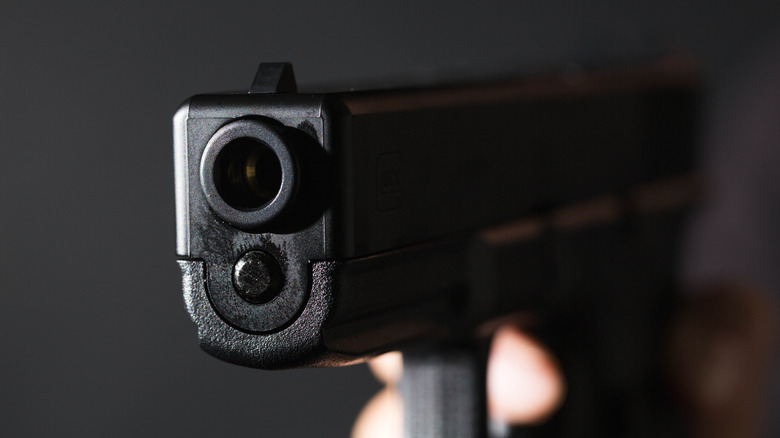What Would Happen If You Shot A Gun In Space? Here's What You Need To Know
Depending on your favorite science fiction franchise, you likely know all about shooting lasers, phasers, and other photon-based weapons in space. That's all well and good, but what about traditional firearms? If you think a gun can't fire in space due to the lack of oxygen, you're incorrect. Because a bullet contains its own oxidizer, it can be fired in space (and underwater), so a vacuum doesn't present a problem.
Still, there's no recorded test or experiment of what happens when a gun is fired in space. Thus, we have to turn to the laws of physics, which tell us precisely what occurs in such a scenario. That said, it would probably be more reliable to rely on something like an electromagnetic rail gun for space-based combat, but that's getting far ahead of the available technology.
Firing a gun in space changes the nature of the explosion, the path of the bullet, and the effects of firing on the shooter. The results are likely what you already know if you're familiar with Newton's laws of motion, specifically the third law: for every action, there is an equal and opposite reaction. Essentially, firing a gun without any atmospheric resistance or gravity would change the bullet's speed and trajectory while simultaneously pushing the firer back in the opposite direction.
Bullets act differently without an atmosphere or gravity
Thanks to the lack of atmosphere, which introduces a drag on any object moving through it, a bullet fired in space would be faster. That said, it would be only slightly faster than on Earth, but one thing it wouldn't do is stop. Earth's gravity means that all fired bullets will eventually land, whether they hit their target or miss it entirely. Without this gravity, a fired bullet would continue moving through space at its maximum speed until it runs out of energy or is acted upon by another force.
So, unless it comes close enough to a planet or other celestial body, the bullet will travel forever. Space may be a massive vacuum, but it's not empty. Solar wind and the occasional atom will interact with the bullet, slowing it down over time, and possibly altering its trajectory. Still, there's no guarantee that a bullet would hit anything in space, given how expansive it actually is. Even with all the satellites orbiting the Earth, the likelihood of a fired bullet hitting anything before it runs out of energy is small.
While you wouldn't hear any sound of the explosion and bullet leaving the barrel, you could "hear" the vibrations, assuming you're wearing a spacesuit while firing. Additionally, the recoil would affect the firer differently than on Earth, sending you in the opposite direction of the bullet. A ship or other bracing object would halt that backward momentum, but without that, you'd travel forever, just like the bullet.

